 Baby Milk Action organised a protest on Tuesday (24 June 2014) outside an event where Nestlé was promoting its SMA formula brand to health workers.
Baby Milk Action organised a protest on Tuesday (24 June 2014) outside an event where Nestlé was promoting its SMA formula brand to health workers.
Nestlé’s event was ostensibly about ‘food hypersensitivity management in infants and pre-school children’, but is part of its strategy to promote the SMA brand in general, and its new SMA HA formula in particular.
A small group offered leaflets to anyone arriving for the event. There was no attempt to disrupt the event or stop people entering. Our aim is to prompt a debate about the conflicts of interest involved in attending such events. Several of the people attending came back to collect a leaflet after parking their cars.
It only takes a few people to make people aware there are leaflets being offered. If you are interested in joining a future protest, see the Nestlé demonstrations page.
As exposed below, the main responsibility of the Maternal and Infant Nutrition staff Nestlé recruits is to ‘Stimulate retail sales through the promotion of infant formulas and cereals to gain Healthcare Professionals recommendations’.
In this blog, I’ll look at what Nestlé is doing, the rules that companies and health workers should follow, where health workers can find independent, accurate information on infant formula, and what you can do to protect the right of health workers, pregnant women and parents to independent, accurate information.
Nestlé circumventing rules on targeting health workers
Nestlé took over the SMA brand from Pfizer Nutrition/Wyeth in December 2012 and we have since seen the aggressive practices it uses around the world being brought to the UK.
It has recruited a team of Nestlé Nutrition Representatives who are targeting health workers. We have had a report of a rep. entering a hospital ward uninvited. When challenged, she asked to see the infant feeding coordinator.
It is a violation of the International Code of Marketing of Breastmilk Substitutes for company reps. to seek contact with pregnant women and parents and there should be no promotion of formula brands in hospital facilities.
UNICEF UK Baby Friendly Initiative (BFI) guidance states:
‘All advertising of products covered by the Code should be prohibited within the policies of the institution and company representatives should have only very restricted access to the service or staff. It is suggested that they see the member of staff considered most expert in infant feeding and that she/he then distribute any relevant scientific and factual information to the rest of the staff in an appropriate manner.’
When it is not ignoring this policy by turning up at hospitals, Nestlé tries to entice health workers to events off site. Although hospitals cannot stop staff from attending, they can refuse to allow them to go in work time. The BFI guidance states:
‘UNICEF UK requires that education provided by the companies not be held on Baby Friendly accredited facilities premises. We also recommend that staff are not allowed to attend such events on work’s time.’
(See the market research questionnaire below distributed with a Nestlé SMA advertisement, which asks health workers if they adhere to their facility’s policy on meeting with reps.)
Nestlé promoting the SMA brand
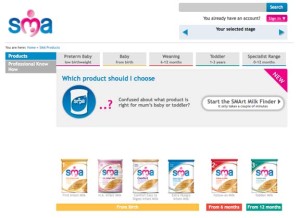 The events Nestlé is organising are branded with the SMA formula name and logo.
The events Nestlé is organising are branded with the SMA formula name and logo.
Health workers have to register via an SMA branded website if they wish to attend, where the products are promoted.
Left: ‘Which product should I choose. Confused about which product is right for mum’s baby or toddler?’
While the International Code allows companies to provide scientific and factual information on products to health workers, company information is generally found to be misleading and not evidence based. This is why Nestlé dislikes having this assessed by experts before being communicated to other staff.
Nestlé undermining the right to accurate, independent information on infant feeding
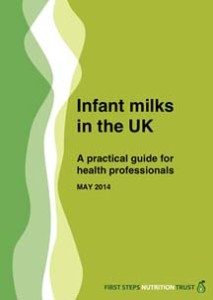 Independent information on company products is available.
Independent information on company products is available.
First Steps Nutrition Trust produces an in-depth analysis of the formulas on the UK market.
The reports can be downloaded from the First Steps Nutrition Trust website.
Baby Milk Action has worked with NHS trusts in Lancashire, which set up the Infant Feeding Information Team (IFIT – under NHS Blackpool and NHS North Lancashire) and now the Lancashire Infant Feeding Information Board (LIFIB).
Health workers anywhere can sign up to receive LIFIB’s bulletin on infant feeding issues, that includes information on formula, such as new products, changes to formulation and packaging, and assessment of the claims companies make for them.
To receive the LIFIB bulletin contact LIFIB@outlook.com or @The_LIFIB
Remember, Baby Milk Action and others have won cases against formula companies misleading parents in their promotion of formula to the public.
Unfortunately, the Advertising Standards Authority (ASA) refuses to investigate similar claims made in advertising directed at health workers, arguing that it is the responsibility of health workers to evaluate the claims themselves.
Health workers are best advised to look to the independent, evidence-based information available. The experts producing these materials critically appraise the information provided by companies.
The LIFIB model for meeting with formula company representatives
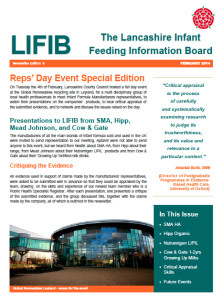 LIFIB invites company representatives to provide information and make presentations to its multi-disciplinary panel.
LIFIB invites company representatives to provide information and make presentations to its multi-disciplinary panel.
It has also organised annual events where the designated health experts in its area can meet with company reps. and put questions to them. It is a model that could usefully be implemented at national level, or at least be followed in other areas.
Representatives are required to submit any scientific research they wish to refer to in advance so this can be critically appraised. An independent expert also makes a presentation on its reliability – and the findings of other studies.
Relevant information is then communicated through the bulletin.
These events have drawn out information that is highly unlikely to have been forthcoming by other means.
For example, under questioning Danone’s representatives admitted that the powder in the Cow & Gate Comfort formula is exactly the same as in Aptamil Comfort formula. The only difference is the packaging and price. The extra markup on Aptamil was explained as covering research and development, but is a marketing ploy to position it as a premium product.
This is the sort of information that health workers really require for when parents come with questions such as ‘which is the best formula?’
Health workers and conflicts of interest
 Health workers also have responsibilities under the International Code of Marketing of Breastmilk Substitutes and subsequent, relevant Resolutions of the World Health Assembly.
Health workers also have responsibilities under the International Code of Marketing of Breastmilk Substitutes and subsequent, relevant Resolutions of the World Health Assembly.
World Health Assembly Resolution 58.32 says to:
‘ensure that financial support and other incentives for programmes and health professionals working in infant and young child health do not create CONFLICTS OF INTEREST’.
Events sponsored or organised by a company with a vested interest in promoting its products clearly create conflicts of interest.
Nestlé offers inducements to health workers to attend events, such as refreshments (served for an hour at the start of the event described above), lunch at longer events and guest speakers.
Sometimes guest speakers are talking on subjects related to Nestlé’s product promotion – such as food hypersensitivity in the above example.
Sometimes they are there simply to draw in health workers who might be interested in topics such as water birth.
Nestlé strategy is to gain health care professional recommendations for its products
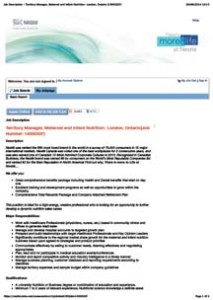 Health workers may feel they are immune to Nestlé’s charms and quite able to assess its information and ignore any claims that are not evidence based.
Health workers may feel they are immune to Nestlé’s charms and quite able to assess its information and ignore any claims that are not evidence based.
But make no mistake, Nestlé thinks otherwise.
It is not organising these events out of altruism, but to gain recommendations for its products.
The following is an extract from the job advertisement for a Nestlé Maternal and Infant Nutrition Territory Manager in Canada this month (application closing date 27 June 2014):
Major Responsibilities:
- Stimulate retail sales through the promotion of infant formulas and cereals to gain Healthcare Professionals recommendations (physicians, nurses, etc.) based in community clinics and offices.
- Manage and develop hospital accounts to targeted growth plan.
- Prospect and build relationships with target Healthcare Professionals and Key Opinion Leaders.
- Significantly contribute to the regional market share growth for infant formula, cereals & foods based upon agreed to strategies and product priorities.
- Communicate effectively by selling to customer needs, listening effectively, being persuasive & negotiating appropriately.
- Plan, lead and /or participate in medical education events/conferences.
Nestlé’s strategy is to induce health care professionals to recommend its products. Yet, the health care system cannot be used to promote products according to the Code. In other words, recommending specific products to parents is a violation.
In the UK, all formula sold has to comply with composition requirements specified in legislation. There is no reason to recommend one brand over another.
Parents who use formula may as well use price and the preferences of their child to select a formula (brands do have different tastes depending, for example, on whether added omega 3 is derived from fish oils, fungi or other sources).
Health workers who support parents who intend to use formula do need to know what is on the market, of course, to be able to answer any questions that may arise. Such as, whether claims made for the products are true and whether one formula really is better than another (all companies claim their brand is better than competing brands). The only way to do this is to have accurate, independent information.
Nestlé’s information will be geared to its stated aim of gaining health care professional recommendations.
Market research on health facility policies and recommending formula
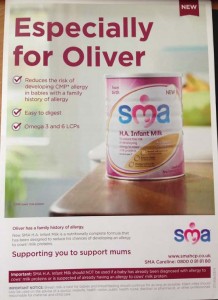 Various health workers have contacted us about a curious market research exercise being conducted by the Millward Brown market research company into a Nestlé SMA advertising campaign.
Various health workers have contacted us about a curious market research exercise being conducted by the Millward Brown market research company into a Nestlé SMA advertising campaign.
We contacted the company to ask if it is doing this research for Nestlé, but it has refused to confirm or deny this.
In any case, the questions reveal how marketers develop their strategies for targeting health workers.
It is also interesting how the focus is on the emotional response to brands (do you ‘love it’ or ‘hate it’) and the feelings induced by advertisements such as that from Nestlé, show left (is it ‘Pleasant, Interesting, Boring or Irritating’).
The issues the questionnaire examines include:
- how health workers source information on infant feeding to give to parents,
- whether policies at their health facility allow formula company reps. to visit the wards,
- the types of issues new mums want to know about,
- whether the health worker would recommend a specific brand to mums
- their knowledge of specific brands
Some examples of the questions:
Q1.7 Please indicate whether or not you are aware of each of the following guidelines and then to what extent you adhere to and agree with each of the guidelines [tick boxes from ‘agree’ to ‘disagree’ with the following guidelines and adhering to them: ‘local authority/governing body guidelines on giving advice about baby feeding’, ‘hospital’s guidelines on giving advice about baby feeding’, ‘the Baby Friendly Initiative in my area’]
[Though the above question identifies those health workers who are prepared to break these guidelines, the questionnaire says responses will be kept anonymous. Is it to prepare an industry lobby claiming a certain percentage of health workers object to company reps. being kept off hospital wards?]
Q3.4 If you were to discuss with mums specific infant formula brands you think would be appropriate for them, please indicate which brands you are most likely to mention.
Q3.7 Which of the following SMA formula milk products have you heard of?
Q3.8 For each of the following brands of formula milk, please indicate how you feel about the brand using the scale provided [from ‘I love it’ to ‘I hate it’].
Q3.13 Which of the following infant formula milk brands do you think is the leading brand of infant formula?
Q3.15 Now thinking about the statement below, please indicate which of the formula brands you associate with each statement below…. ‘Their infant milk is closest to breastmilk… This brand helps the baby settle… This brand is leading the way in reducing allergy…’
Section 4: Communication Awareness [Various questions about signing up to company emails, visiting websites and attending study days]
Q4.7 If you indicated at Q4.1 that you attended a study day for one or more of the following companies in the last three months, please indicate on the scale below how the day changed you feelings towards the brand [emphasis as in the questionnaire – scale from ‘Feel much more positive towards the brand’ to ‘Feel much more negative towards the brand’]
Section 5: Formula milk manufacture services [Various questions about services formula milk companies could provide to health workers]
Section 6: Infant Formula Reps [Questions asking how many times the health worker has met reps. from the main companies in the past year and if they didn’t meet any, why not]
Section 7: Advertising [the health worker is instructed to open an envelope containing a Nestlé advertisement for the SMA HA milk it is currently promoting in journals and at the study days]
Q7.6/7/8 Which one of these four words do you think applies most to the advert? [choose one from each set of options: ‘Pleasant, Interesting, Boring, Irritating’, ‘Soothing, Distinctive, Dull, Unpleasant’, ‘Gentle, Involving, Weak, Disturbing’]
[I find the questions about the advertisement interesting, because there are no questions about whether it provides sufficient scientific and factual information, and whether the references are clear (actually, it does not give any references). Instead the focus is on how well it works to arouse positive feelings for the brand].
Not just Nestlé
Nestlé is not alone in pursuing these strategies, of course. Its leading competitor, Danone, is also targeting health workers through sponsorship, study days, professional services and other initiatives.
Since Nestlé entered the UK, things seem to becoming more aggressive. This year, we have seen Hipp also embarking on the study day route to reach parents.
It is illuminating to see the information provided by Mead Johnson, a US company, as part of its statutory ‘Form 10K’ report to the US Security and Exchange Commission for the year ending December 2013:
‘Our sales force educates health care professionals about the benefits of our infant formula products in each of the countries where we market our infant formula products. Primary marketing efforts for infant formula products are directed toward securing the recommendation of the Enfa family of brands by physicians or other health care professionals. We focus our product detailing efforts on neonatal intensive care units, physicians and other health care professionals, hospital group purchasing organizations and other integrated buying organizations. Our sales force receives training on our products and customer service skills. We support health care professionals by organizing continuing medical education programs, symposia and other educational interfaces.’
What do you think?
Baby Milk Action has embarked on its ‘Say NO to formula company sponsorship‘ campaign in response to the many messages of concern we receive from health workers who are targeted by companies and also dismayed to see events they might otherwise attend being sponsored by companies.
You will find a range of resources available for promoting the campaign in our online Virtual Shop.
We welcome all views.
Let us know what you think by posting a comment below, or contact us.
